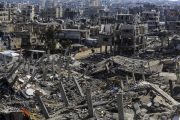
Iran is presently a “legitimate target” for Israeli attacks, Israeli Economy Minister Nir Barkat told The Telegraph, stoking ears of an armed conflict with Tehran. The Israeli minister also claimed that the war in Gaza was not being waged with sufficient aggression by the Israel Defense Forces (IDF).
“Iran is a legitimate target for Israel,” said Barkat. “They will not get away with it. The head of the snake is Tehran. My recommendation is to adopt the strategy that President Kennedy used in the Cuban Missile Crisis. What he basically said then was, ‘A missile from Cuba will be answered with a missile to Moscow,’” the minister elaborated, alluding to the 1962 clash between the United States and the USSR.
Barkat’s remarks reinforced a recent statement by Prime Minister Benjamin Netanyahu, who castigated Iran for backing militant groups in Gaza.
Furthermore, Israel claims that Iran participated in plotting the October 7 attacks staged by the terrorist group Hamas that killed around 1,200 people and took more than 200 hostage. Israel has previously openly accused Iran of aiding Hamas “with money, training and weapons and technological know-how” and intelligence.
“Iran is standing behind it. We are in conflict with Iran. Imagine not what Iran can do to us, to destroy us,” Netanyahu said, claiming he will only agree to a deal that grants West Jerusalem security control over all of Gaza.
Iran has denied any role in the Hamas assault on Israel, with Iranian Foreign Ministry spokesman Nasser Kanani saying such accusations were “based on political reasons.”
Netanyahu added that “Iran is the head of the octopus and you see its tentacles all around from the Houthis to Hezbollah to Hamas.”
Israel retaliated by conducting an aerial bombardment and ground operation against Gaza, thus far killing around 25,000 people, according to local Gaza health officials. The operation is aimed at eradicating Hamas, Israel has claimed.
On January 18, Netanyahu said that Israel was already conducting direct attacks on Iran and is making every possible effort to stop Tehran from obtaining nuclear weapons.
Answering a reporter’s question in Tel Aviv about why Israel was staging attacks on Iran’s proxies rather than attacking the country directly, Netanyahu replied, “Who says we are not attacking Iran, we are attacking.”
Israel rarely publicly acknowledges attacking Iran directly, but the latter has long been a target of Netanyahu during his various terms in power.
Iran has widely been regarded by Israel and the United States as the major destabilizing power in the Middle East, allegedly providing weapons, military expertise, and training to Hamas in Gaza, Hezbollah in Lebanon, and the Houthi rebels in Yemen.
The United States has previously accused Iran of being “deeply involved” in Houthi attacks on commercial ships in the Red Sea, claiming that Tehran has provided the rebels with drones, missiles, and intelligence. On their end, Iran has denied the allegation, maintaining that “resistance groups” are acting independently and “not taking orders from Tehran to confront the war crimes and genocide committed by Israel.”
In December, former Israeli prime minister Naftali Bennett disclosed that Israel had attacked an unmanned aerial vehicle base in Iran and killed a senior Islamic Revolutionary Guard Corps commander. Bennett, who was Israeli prime minister from June 2021 to June 2022, admitted Israel’s acts in an op-ed published in The Wall Street Journal.
Just after midnight in Iraq on January 24, the U.S. Central Command (CENTCOM) said in a statement that it had staged “proportionate” airstrikes against Iranian-backed militants in Iraq after recent attacks on American bases in the region.
The strikes were targeting Kataib Hezbollah’s headquarters in Iraq, as well as storage and training facilities, and were meant to undermine the group’s ability to conduct drone and missile attacks.
“Today, at President Biden’s direction, US military forces conducted necessary and proportionate strikes on three facilities used by the Iranian-backed Kataib Hezbollah militia group and other Iran-affiliated groups in Iraq,” U.S. Secretary of Defense Lloyd Austin announced in a statement.
“These precision strikes are in direct response to a series of escalatory attacks against U.S. and coalition personnel in Iraq and Syria by Iranian-sponsored militias.”
Iranian-backed groups in Iraq and Yemen have waged dozens of attacks against U.S. forces in the region since the Israel-Hamas war began last October. A recent strike, which the Pentagon called the largest since the conflict began, came when rockets and missiles were aimed at a U.S. air base in western Iraq, wounding several American troops. One Iraqi soldier stationed at the base was badly injured, based on reports from the Pentagon.
Austin said he and Biden will not hesitate to “take necessary action” to defend U.S. forces and their allies in the region. “We do not seek to escalate conflict in the region. We are fully prepared to take further measures to protect our people and our facilities. We call on these groups and their Iranian sponsors to immediately cease these attacks.”
Iraq’s government denounced the previous round of U.S. airstrikes against Kataib Hezbollah last month, lambasting them as “an unacceptable violation of Iraqi sovereignty.” The U.S. airstrikes in December killed one member of Baghdad’s security forces and injured 18 people, including civilians, per the Iraqi prime minister’s office.
Meanwhile, two U.S. Navy SEALs who went missing during an operation to seize Iranian arms headed for Yemen’s Houthi rebels have been declared dead after a 10-day search failed to find them, the U.S. military said.
U.S. Central Command (CENTCOM) had previously admitted that two SEALs who were reported as lost at sea participated in the 11 January operation, in which the elite special-operations personnel boarded a dhow off the coast of Somalia and seized Iran-made missile components.
“We regret to announce that after a 10-day exhaustive search, our two missing US Navy SEALs have not been located and their status has been changed to deceased,” CENTCOM said in a statement on January 21. “The search and rescue operation for the two Navy SEALs reported missing during the boarding of an illicit dhow carrying Iranian advanced conventional weapons … concluded and we are now conducting recovery operations,” the statement read.




